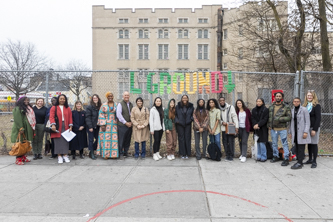President Michelle J. Anderson Joins CUNY Chancellor Félix V. Matos Rodríguez for Tour of Flatbush African Burial Grounds with Brooklyn College Students Who Are Interning at the Site
February 22, 2023

President Michelle J. Anderson (right) join student interns at the burial grounds, along with CUNY Chancellor Félix V. Matos Rodríguez and African Burial Grounds Coalition President Samantha Bernardine, on February 16 for a walking tour.
President Michelle J. Anderson and CUNY Chancellor Félix V. Matos Rodríguez toured the Flatbush African Burial Grounds, a burial site for enslaved Africans in the 1700s, on February 16.
The group was guided by Brooklyn College students who are working with the Flatbush African Burial Ground Coalition (FABGC), a Black-led multiracial coalition working to protect the site on a semester-long paid internship to align their studies in anthropology and sociology to the present-day struggle for racial justice in the heart of Brooklyn.
The internship program is one of 17 Brooklyn College Black, Race and Ethnic Studies Initiative (BRESI) programs, launched last March to create a more inclusive curriculum, increase opportunities for students to engage in BRESI-related research and internships, and improve communication, understanding, and empathy between the diverse groups that make up CUNY’s campus communities. There are 126 total projects across CUNY that have received awards to fund projects, thanks to a $3 million grant from the Andrew Mellon Foundation.
“We are incredibly proud of the work being done by students and faculty in Brooklyn College’s 17 BRESI projects,” said Anderson. “These projects enlighten students about ethnic studies and inspire them to become experts and leaders in these fields.”
“The Flatbush African Burial Grounds internship program provides a powerful illustration of CUNY’s multidisciplinary expansion and reconceptualization of Black, race, and ethnic studies as a living, breathing academic field that can provide many avenues for students to drive social change in their communities,” said Rodríguez. “As CUNY students participate in experiential learning opportunities and expand the breadth and depth of their understanding of the evolving significance of race and ethnicity in our society, they can also acquire knowledge and skills that will help them to thrive in their chosen fields of study and careers.”
The student-interns work up to 10 hours a week with FABGC in conjunction with a course taught by Assistant Professor of Anthropology Kelly Britt, who is co-project leader on the FABG program alongside Emily Tumpson Molina, associate professor of sociology and director of Brooklyn College’s Center for the Study of Brooklyn (CSB). This program is in its second semester.
Giving back to her community is nothing new to Catalina Rodríguez, who moved to Brooklyn from her native Colombia one year ago. Rodríguez is a film major who is interested in production design. She is in her first semester working with the FABGC BRESI and also volunteers at the local nonprofit, Immigrant Assistance Services.
Because she is also an experienced photographer and videographer, Rodríguez will be putting her interest in film to good work by helping to document FABGC tours.
“I saw a flyer about the FABGC internship and it really seemed like a good way to connect with my community in Flatbush,” Rodríguez said. “I feel it is important to make Brooklyn a better place, and this opportunity is allowing me to do just that.”
In addition to facilitating interdisciplinary research on the borough of Brooklyn by faculty and students, the CSB coordinates experiential and community-based education and community-based internships in the borough, including the FABGC initiative. The center submitted the BRESI grant proposal and administers the FABGC initiative.
“On behalf of the coalition leadership, one of the objectives of FABGC is to continue to inform and educate the youth within the community about the importance of this sacred site. This site is not only a site of Brooklyn history, but global history,” said FABGC President Samantha Bernardine. “We believe it is imperative that we empower the next generation to be civically engaged and responsible for protecting and preserving the legacy and contributions of Black people to this city and world.”
In fall 2022, program participants worked to attain 501(c)3 nonprofit status for the FABGC; held community-based meetings and workshops; created walking tour content for community members; assembled informational toolkits for neighborhood churches; and undertook community surveys regarding the grounds, among other activities. They will continue these activities this spring along with creating a Historical Trauma and Wellness Toolkit.






